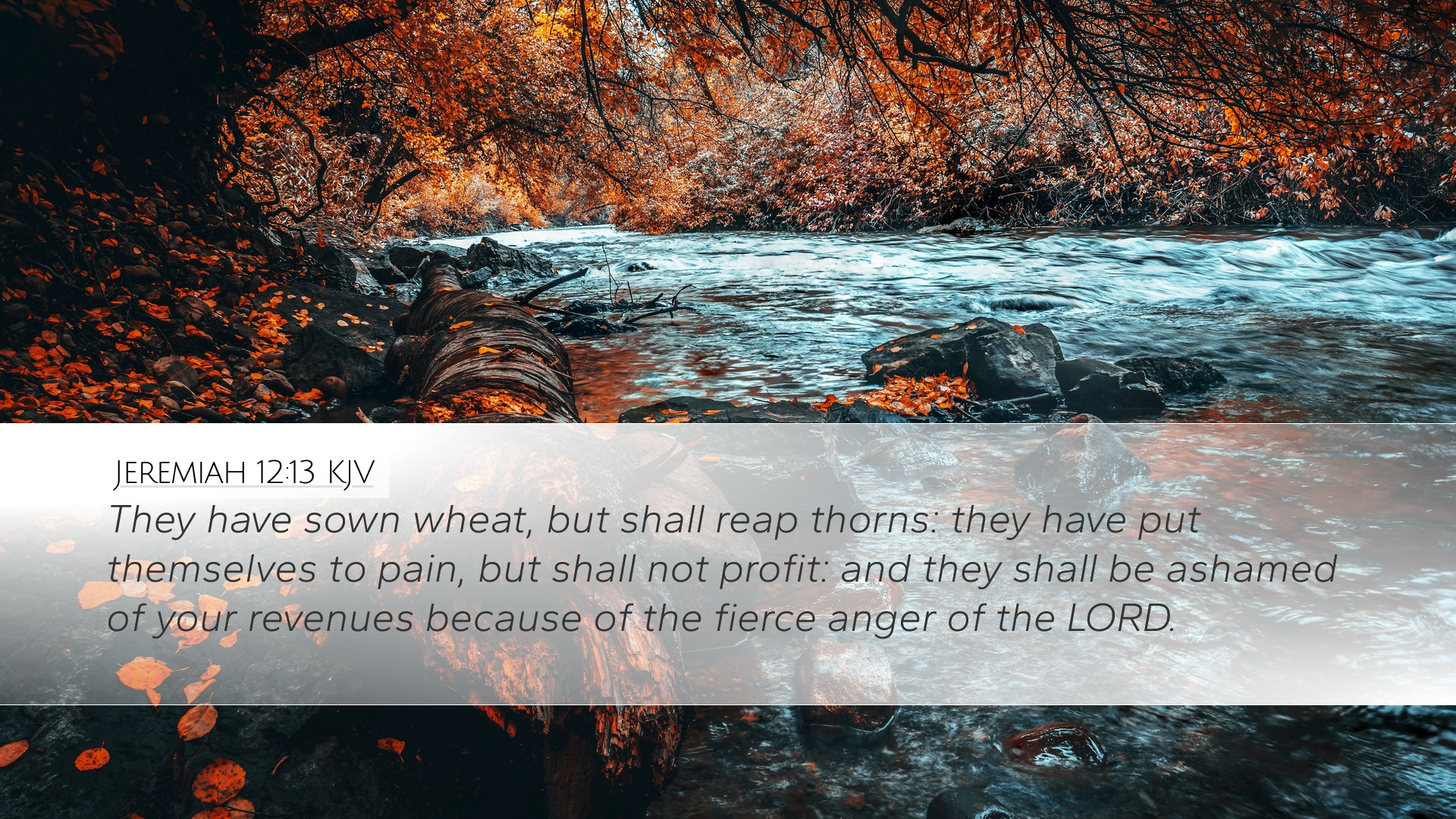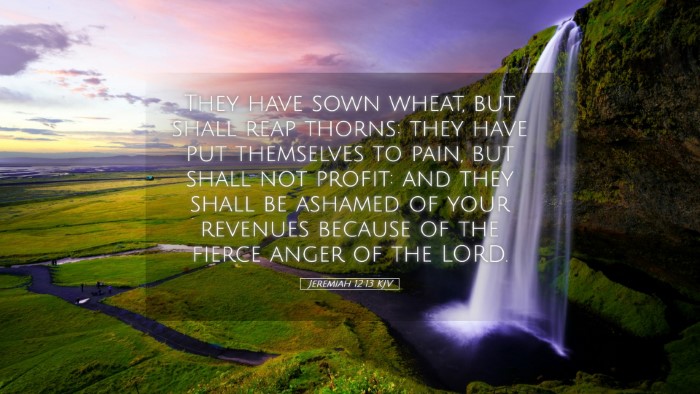Commentary on Jeremiah 12:13
Verse Reference: Jeremiah 12:13 - "They have sown wheat, but reaped thorns; they have put themselves to pain, but did not profit: and they shall be ashamed of their revenues because of the fierce anger of the Lord."
Introduction
The prophetic words of Jeremiah, often filled with lamentation and earnest supplication, bring to light the struggles of God's people during a time of national crisis. In Jeremiah 12:13, we encounter a poignant expression of disillusionment, portraying a stark contrast between expectation and reality in the spiritual life of Judah.
Historical Context
Matthew Henry emphasizes the background of this verse, noting that Judah is experiencing the consequences of their unfaithfulness to God. The agricultural metaphor, sowing wheat yet reaping thorns, illustrates the futility of their efforts under God's judgment. This sentiment reflects a broader theological theme present throughout Jeremiah's writings, where disobedience leads to divine retribution.
Analysis of the Text
Imagery of Sowing and Reaping
Albert Barnes elaborates on the imagery used by Jeremiah in this verse. Sowing wheat symbolizes efforts towards righteousness and the expectation of blessing, while the thorns signify destruction and disappointment. This stark contrast serves to remind the faithful that spiritual endeavors devoid of fidelity yield nothing but sorrow and shame.
Theological Implications
Jeremiah's lamentation reflects a theologically rich understanding found in scripture that God’s people are often faced with the consequences of their actions. Adam Clarke points out that despite their labor, the people of Judah are reaping what they have sown—injustice, idolatry, and moral decay. This serves as an essential reminder for contemporary believers about the nature of divine justice.
Reflections on Human Efforts
In verse 13, the phrase "they have put themselves to pain, but did not profit" speaks volumes about human effort apart from divine blessing. Matthew Henry interprets this as a profound truth: without God's favor, even the most diligent efforts can result in futility. The spiritual application here is significant for ministers and students of the Word: success in ministry or life cannot be achieved through mere human strength but must be grounded in faithfulness to God.
The Nature of Divine Anger
The verse concludes with the declaration that "they shall be ashamed of their revenues because of the fierce anger of the Lord." Albert Barnes notes that the shame referred to is not merely social but deeply spiritual. The anger of the Lord is a theme prevalent throughout scripture, as it underscores God's holiness and the serious nature of sin. This acknowledgment of divine anger can serve as a warning to modern congregations and leaders regarding the gravity of turning away from God's commandments.
Shame and Restoration
The concept of shame in this context is pivotal. Adam Clarke observes that while shame can denote a hopeless state, it can also lead to repentance and eventual restoration. The recognition of their failure serves as a catalyst for the people of Judah to turn back to God. For pastors and theologians, this notion of shame is vital in discussions about discipleship and the journey of faith, as it invites believers back into the fold of God's grace.
Application for Today's Believers
- Recognition of Efforts: Believers must assess their spiritual endeavors and motivations. Are they sowing in faith, or are they relying on their understanding?
- Understanding God’s Judgment: The reality of divine discipline should encourage self-examination and a return to faithfulness.
- Embracing True Repentance: Acknowledging failure and experiencing shame can lead to a transformative repentance, renewing one’s relationship with God.
- Faith Amid Trials: Just as Judah faced punishment, believers today are called to remain steadfast, trusting that struggles may lead to greater dependence on God.
Conclusion
Jeremiah 12:13 serves as a poignant reminder of the nature of God's justice and grace. Through the lens of historical context and the rich theological insights provided by biblical commentators, the verse encourages an introspective journey towards faithfulness. The metaphor of sowing and reaping remains timeless, urging current and future generations to align their lives with God's will, ensuring that their efforts yield spiritual fruit rather than thorns.


